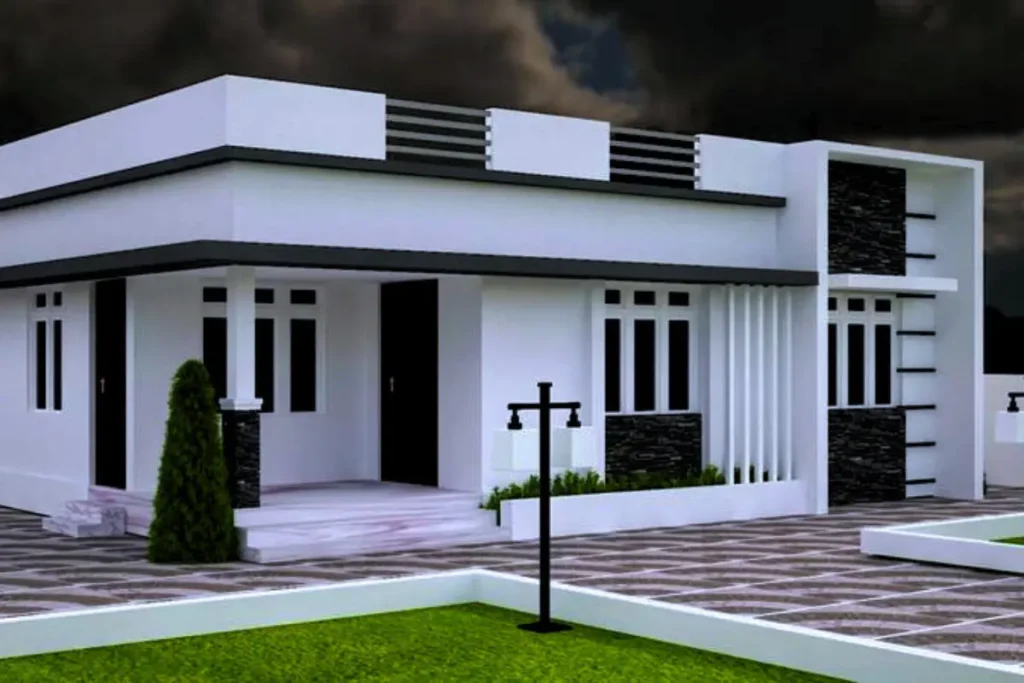Learn how I completed a 2BHK home within a tight House Construction Budget of ₹15,00,000 with a real case study, downloadable tools, and cost-saving tips.
Table of Contents
Introduction

Managing a House Construction Budget is like walking a tightrope. One small slip and costs can spiral out of control.
In this blog post, I share how I constructed a 2BHK house in Maharashtra with a House Construction Budget of just ₹15 Lakh. This journey wasn’t just about cost-saving—it was about making smart choices, handling real on-site issues, and staying committed to the goal.
If you’re someone looking for cost-effective solutions, tools like Rate analysis Excel Sheet downloads, or simply need a practical case study, you’re in the right place.
Project Details and Background
I always dreamed of building my own home. With land already available in my village near Kolhapur, all I needed was a solid plan and the will to execute it within a House Construction Budget of ₹15,00,000.
The house is a single-floor structure with two bedrooms, one hall, a kitchen, and two bathrooms. My aim was to make it practical and long-lasting, without any unnecessary luxury that could drive up the costs.
House Construction Budget Planning
I started by breaking down every component of the house construction. From excavation to electrical work, I listed all the possible cost heads.
To do this, I used a Rate analysis Excel Sheet, which made things very clear. It allowed me to visualize how each activity would affect the overall House Construction Budget.
Initial Budget Allocation:
| Work Type | Allocated Cost (₹) |
|---|---|
| Site Clearing & Excavation | 30,000 |
| Foundation (Load-Bearing) | 1,20,000 |
| Masonry (Brickwork) | 2,50,000 |
| Slab Work (RCC Roof) | 1,00,000 |
| Flooring & Finishing | 1,50,000 |
| Electrical | 80,000 |
| Plumbing | 70,000 |
| Doors & Windows | 1,00,000 |
| Painting & Plaster | 1,60,000 |
| Fixtures (Kitchen/Bathroom) | 90,000 |
| Labour Charges | 1,50,000 |
| Contingency | 1,20,000 |
| Total | 15,00,000 |
Step-by-Step Cost Distribution
Foundation: Smart Structural Choices
I chose a load-bearing structure instead of an RCC frame. The soil had good bearing capacity, so there was no need to spend extra on columns and beams.
This decision alone saved me over ₹1 lakh and made it easier to stick to my House Construction Budget.
Masonry Work
The bricks were sourced from a local kiln at ₹7.5 per piece. For mortar, I used PPC cement and sand from a nearby river.
The work was simple but effective, giving my walls strength without unnecessary layers or design.
RCC Slab
I kept the RCC work to the roof slab only. Steel was used minimally and shuttering plates were rented instead of bought.
Even though the cost of steel was rising, planning early helped me stay within the House Construction Budget.
Finishing Touches
For flooring, I chose ceramic tiles at ₹35/sq.ft. They were affordable and easy to clean.
I avoided vitrified tiles and marble. It was one of the hardest compromises, but a wise one in the context of my House Construction Budget.
Rate Analysis Excel Sheet Downloads
Here are the Excel sheets that helped me manage every rupee:
- Rate analysis excel sheet download free
- Simple rate analysis excel sheet download
- Rate analysis Excel Sheet Free Download PDF
- CPWD rate analysis Excel format
- Rate analysis of Civil works Excel free Download India
- Rate Analysis Excel Sheet for civil works
- Construction rate analysis excel sheet download
I reviewed my House Construction Budget weekly using these files. They helped me correct any deviations early.
Materials Used and Alternatives
Buying local saved me a huge chunk of money. Instead of fancy brands, I went for durability and availability.
I used PPC cement, local kiln bricks, aluminum windows, and ceramic tiles. For woodwork, I chose local carpenters using Sal wood.
All these helped reduce costs while maintaining a decent quality standard for the home.
Money-Saving Techniques That Worked
- No false ceiling or decorative moldings
- Rented shuttering plates
- Simple design with square-shaped rooms
- No overhangs or balconies
- Painted with Tractor Emulsion instead of expensive brands
Each of these steps was taken after asking myself, *”Will this increase the House Construction Budget unnecessarily?”
Real-Life Challenges and How I Overcame Them
One major challenge I faced was cement price fluctuation. I had to pre-book 100 bags in advance, which helped me save at least ₹20,000.
Another issue was labour delays during festivals. I made a flexible work schedule to avoid loss of time and maintain progress.
Changing the kitchen layout mid-way almost pushed me over budget, but by removing a decorative arch, I brought things back under control.
Useful Resources for Civil Engineers
If you’re serious about tracking your House Construction Budget, these tools are must-haves:
- Bar Bending Schedule Excel Sheet Free
- Almari Design DWG Free Download
- How to Save ₹40,000+ in Construction
- STAAD Pro Software Free Download 2025
- Microsoft Excel for Estimation
These tools helped me make data-backed decisions at every step.
Conclusion
Building a home within a House Construction Budget of ₹15 Lakh is not a myth—it’s absolutely possible with discipline and tools.
You must plan every material, negotiate every price, and avoid any unnecessary frills. Rate analysis Excel sheets helped me maintain control and confidence in the budget.
“Plan like an engineer, spend like an accountant.”
Stick to this mindset and your dream home will become a reality.
FAQs
Q1. Can I build a 2BHK house in India for ₹15 Lakh?
Yes, especially in semi-urban/rural areas using cost-saving structural and material choices.
Q2. Which tool is best for House Construction Budget tracking?
A detailed rate analysis Excel sheet is your best companion.
Q3. Where can I download a construction estimation Excel sheet?
You can download it for free at civilthings.com
Q4. How do I keep my House Construction Budget under control during construction?
Track weekly expenses, avoid design changes, and buy materials in bulk.
यहाँ मेरा व्यक्तिगत अनुभव है, खासकर तकनीकी पहलुओं को लेकर, जब मैंने ₹15 लाख के सीमित बजट में अपना घर बनाया:
शुरुआत में मैंने प्लानिंग के समय खुद AutoCAD पर प्लान ड्रॉ किया जिससे आर्किटेक्ट की फीस बची। उसके बाद, मैंने प्लिंथ लेवल से लेकर स्लैब कास्टिंग तक हर स्टेज पर क्वांटिटी एस्टिमेशन खुद किया, ताकि कोई वेस्टेज न हो। मैंने M20 ग्रेड कंक्रीट का उपयोग किया, और स्लैब के लिए Ready Mix Concrete (RMC) की जगह साइट मिक्सिंग को प्राथमिकता दी जिससे लागत 12-15% कम हुई। ईंटों की जगह मैंने Fly Ash Bricks का उपयोग किया, जो सस्ते, मजबूत और थर्मल इंसुलेशन में बेहतर हैं।
स्टील खरीदते वक्त मैंने TMT Fe 500 ग्रेड का इस्तेमाल किया और इसे सीधे स्टॉकिस्ट से थोक में खरीदा जिससे बिचौलिए का खर्च बचा। साइट पर लेबर को रोज़ाना वर्क टार्गेट के हिसाब से लगाया, जिससे Productivity बनी रही और टाइम वेस्ट नहीं हुआ। प्लंबिंग और वायरिंग मैंने कंड्युट पद्धति से करवाई जिससे बाद में मेंटेनेंस आसान हो। छत की ढलान और वाटरप्रूफिंग पर मैंने विशेष ध्यान दिया ताकि लीकेज न हो – इसके लिए मैंने ब्रश एप्लिकेशन Waterproof Coating का इस्तेमाल किया।
इस पूरे निर्माण में टेक्निकल प्लानिंग और खुद की निगरानी ही असली गेमचेंजर रही – इससे बजट भी कंट्रोल में रहा और क्वालिटी भी बनी रही।

Hi! I’m Sandip, a civil engineer who loves sharing about Civil Engineering & new ideas and tips. My blog helps you learn about engineering in a fun and easy way!
